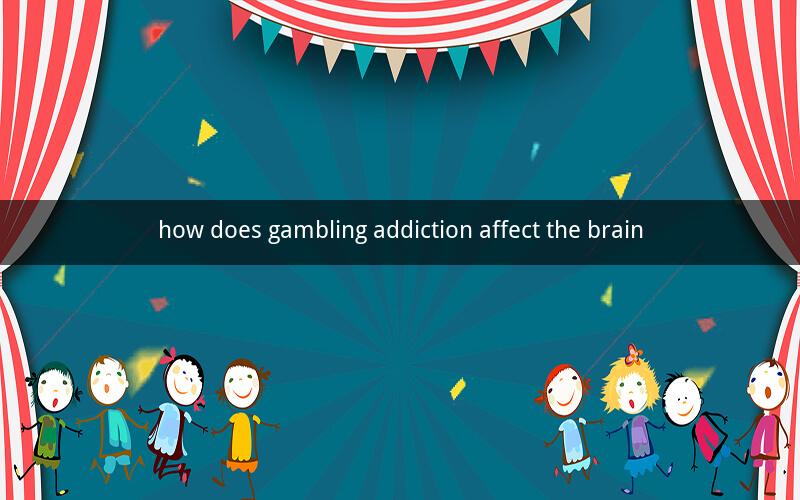
How Does Gambling Addiction Affect the Brain?
Table of Contents
1. Introduction to Gambling Addiction
2. The Brain's Reward System
3. Dopamine and the Gamblers' High
4. The Role of the Prefrontal Cortex
5. Cognitive Impairments
6. Emotional Disturbances
7. The Cycle of Compulsive Gambling
8. Neuroimaging Studies on Gambling Addiction
9. Treatment and Intervention
10. Conclusion
1. Introduction to Gambling Addiction
Gambling addiction, also known as pathological gambling, is a condition characterized by an inability to control the urge to gamble, despite the negative consequences it may have on one's life. This addiction can lead to significant personal, financial, and social problems. Understanding how gambling addiction affects the brain is crucial in developing effective treatments and interventions.
2. The Brain's Reward System
The brain's reward system plays a central role in gambling addiction. This system is responsible for reinforcing behaviors that are beneficial to survival and reproduction. When a person wins at gambling, the brain releases dopamine, a neurotransmitter associated with pleasure and reward.
3. Dopamine and the Gamblers' High
Dopamine is a key player in the brain's reward system. When a person engages in gambling, the anticipation of winning triggers the release of dopamine. This release creates a sense of euphoria, commonly referred to as the "gamblers' high." Over time, repeated exposure to this high can lead to the development of addiction.
4. The Role of the Prefrontal Cortex
The prefrontal cortex, a region of the brain responsible for decision-making, impulse control, and planning, plays a crucial role in gambling addiction. When a person is addicted to gambling, the prefrontal cortex may become less active, making it difficult to resist the urge to gamble. This decreased activity can also lead to poor decision-making and a lack of insight into the consequences of gambling.
5. Cognitive Impairments
Gambling addiction can lead to various cognitive impairments, including attention deficits, memory problems, and decision-making difficulties. These impairments can further exacerbate the addiction, as individuals may struggle to recognize the negative impact of their gambling behavior.
6. Emotional Disturbances
Gambling addiction can also cause emotional disturbances, such as anxiety, depression, and irritability. These emotional disturbances can be a result of the stress associated with the addiction, as well as the negative consequences of gambling, such as financial loss and relationship problems.
7. The Cycle of Compulsive Gambling
Gambling addiction often follows a cycle of compulsive gambling. This cycle includes the anticipation phase, the action phase, and the relief phase. During the anticipation phase, individuals experience increased anxiety and excitement. The action phase involves the actual gambling behavior, while the relief phase is characterized by a temporary relief from the anxiety and excitement. This cycle can lead to a compulsive need to continue gambling, despite the negative consequences.
8. Neuroimaging Studies on Gambling Addiction
Neuroimaging studies have provided valuable insights into the brain's response to gambling. These studies have shown that individuals with gambling addiction exhibit altered activity in brain regions associated with reward, decision-making, and impulse control. These findings support the idea that gambling addiction is a brain disorder, rather than a moral failing.
9. Treatment and Intervention
Treating gambling addiction involves a combination of psychotherapy, medication, and support groups. Cognitive-behavioral therapy (CBT) is particularly effective in helping individuals develop coping strategies and address the underlying issues contributing to their addiction. Medications, such as antidepressants and mood stabilizers, may also be prescribed to manage co-occurring mental health disorders.
10. Conclusion
Gambling addiction has a profound impact on the brain, affecting various cognitive and emotional processes. Understanding the neurobiological mechanisms of gambling addiction is essential for developing effective treatments and interventions. By addressing the underlying brain changes associated with addiction, individuals can overcome their gambling addiction and reclaim their lives.
Questions and Answers
1. What is the primary neurotransmitter involved in the brain's reward system?
- The primary neurotransmitter involved in the brain's reward system is dopamine.
2. How does the prefrontal cortex contribute to gambling addiction?
- The prefrontal cortex plays a role in decision-making and impulse control. In gambling addiction, the prefrontal cortex may become less active, making it difficult to resist the urge to gamble.
3. What are some cognitive impairments associated with gambling addiction?
- Cognitive impairments associated with gambling addiction include attention deficits, memory problems, and decision-making difficulties.
4. How does gambling addiction affect emotional well-being?
- Gambling addiction can lead to emotional disturbances such as anxiety, depression, and irritability.
5. What is the cycle of compulsive gambling?
- The cycle of compulsive gambling includes the anticipation phase, the action phase, and the relief phase.
6. How can neuroimaging studies help in understanding gambling addiction?
- Neuroimaging studies can reveal altered activity in brain regions associated with reward, decision-making, and impulse control, providing insights into the neurobiological mechanisms of gambling addiction.
7. What types of treatments are available for gambling addiction?
- Treatments for gambling addiction include cognitive-behavioral therapy (CBT), medication, and support groups.
8. How can cognitive-behavioral therapy (CBT) help individuals with gambling addiction?
- CBT can help individuals develop coping strategies and address the underlying issues contributing to their addiction.
9. What role do support groups play in the treatment of gambling addiction?
- Support groups provide a community of individuals who share similar experiences, offering emotional support and practical advice for overcoming addiction.
10. Can gambling addiction be treated successfully?
- Yes, gambling addiction can be treated successfully with the right combination of therapies and support. With commitment and the right resources, individuals can overcome their addiction and lead fulfilling lives.